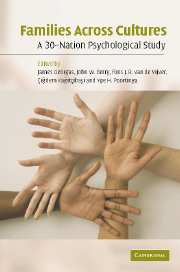Book contents
- Frontmatter
- Contents
- List of figures
- List of tables
- List of contributors
- Acknowledgments
- Prologue
- Part I
- Part II
- 9 The Algerian family: change and solidarity
- 10 Botswana
- 11 The Brazilian jeitinho: Brazil's sub-cultures, its diversity of social contexts, and its family structures
- 12 Britain
- 13 Bulgaria: socialism and open-market economy
- 14 Canada
- 15 Chile: new bottle, old wine
- 16 Cyprus
- 17 Portrait of family in France
- 18 Georgia
- 19 Germany: continuity and change
- 20 Ghana
- 21 Greece
- 22 Hong Kong, SAR China: transitions and return to the motherland
- 23 India
- 24 Indonesia: traditional family in a changing society
- 25 The Iranian family in a context of cultural diversity
- 26 Japan: tradition and change in the Japanese family
- 27 Mexico
- 28 Mongolia: traditions and family portrait
- 29 The Netherlands: tolerance and traditionalism
- 30 Nigeria
- 31 Pakistan: culture, community, and filial obligations in a Muslim society
- 32 The Saudi society: tradition and change
- 33 The South African family
- 34 South Korea
- 35 Spain: tradition and modernity in family structure and values
- 36 Turkey
- 37 Ukraine
- 38 Family in the United States: social context, structure, and roles
- Appendix
- References
- Index
29 - The Netherlands: tolerance and traditionalism
Published online by Cambridge University Press: 10 December 2009
- Frontmatter
- Contents
- List of figures
- List of tables
- List of contributors
- Acknowledgments
- Prologue
- Part I
- Part II
- 9 The Algerian family: change and solidarity
- 10 Botswana
- 11 The Brazilian jeitinho: Brazil's sub-cultures, its diversity of social contexts, and its family structures
- 12 Britain
- 13 Bulgaria: socialism and open-market economy
- 14 Canada
- 15 Chile: new bottle, old wine
- 16 Cyprus
- 17 Portrait of family in France
- 18 Georgia
- 19 Germany: continuity and change
- 20 Ghana
- 21 Greece
- 22 Hong Kong, SAR China: transitions and return to the motherland
- 23 India
- 24 Indonesia: traditional family in a changing society
- 25 The Iranian family in a context of cultural diversity
- 26 Japan: tradition and change in the Japanese family
- 27 Mexico
- 28 Mongolia: traditions and family portrait
- 29 The Netherlands: tolerance and traditionalism
- 30 Nigeria
- 31 Pakistan: culture, community, and filial obligations in a Muslim society
- 32 The Saudi society: tradition and change
- 33 The South African family
- 34 South Korea
- 35 Spain: tradition and modernity in family structure and values
- 36 Turkey
- 37 Ukraine
- 38 Family in the United States: social context, structure, and roles
- Appendix
- References
- Index
Summary
A HISTORICAL OUTLINE OF THE NETHERLANDS
The Netherlands originated from a union of regions (Republic of Seven Provinces) led by the provinces of South-Holland and North-Holland, and with members of the House of Orange as military leaders. Under the Oranges the country gained independence in an Eighty Years War against Spain that ended in 1648. After the French revolution the Netherlands became a kingdom. Its present population is just over 16 million inhabitants, of whom approximately one-quarter is concentrated in the densely populated area around Amsterdam and Rotterdam. The Netherlands was one of the founding members of the European Union.
ECOLOGICAL FEATURES
The Netherlands is a small and densely populated area in northwest Europe, of which the history and ecological system is dominated by the sea and the large rivers. Large parts of the country, called polders, are below sea-level and have to be protected by dikes. The same goes for the substantial landwinnings from an inland sea made in the twentieth century. The cooperation needed to protect the land has become a token for the political model of constant communication in search of joint solutions, called the “poldermodel.” It may well be that this cooperation model has still deeper roots in the coexistence of approximately equal Protestant and Catholic religious groups and the strong merchant orientation of the provinces of Holland in the period that they dominated the world seas (first half of the seventeenth century).
- Type
- Chapter
- Information
- Families Across CulturesA 30-Nation Psychological Study, pp. 410 - 418Publisher: Cambridge University PressPrint publication year: 2006
- 2
- Cited by

